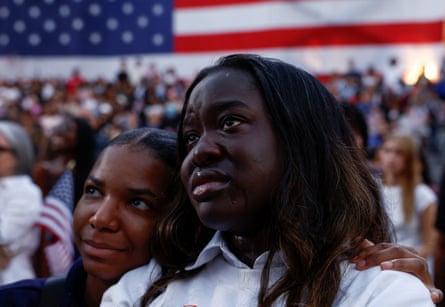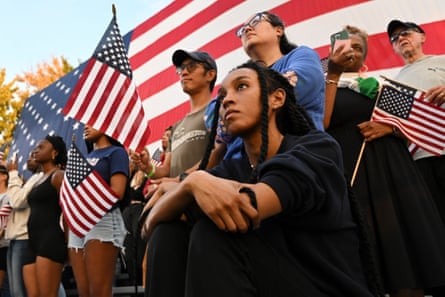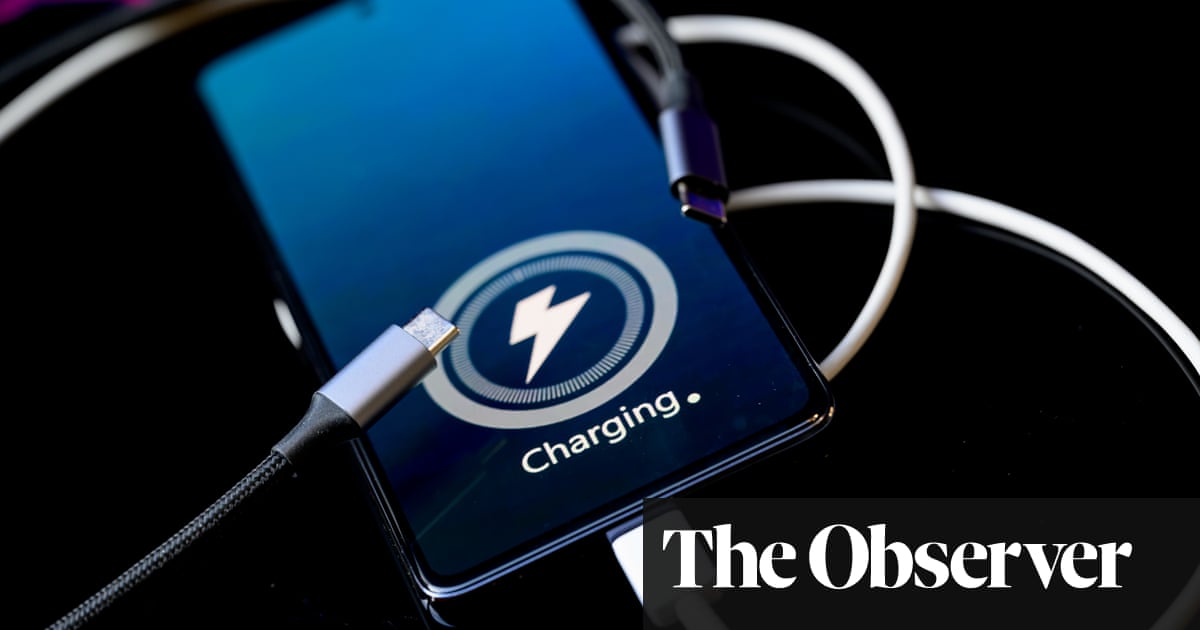“I am still processing my feelings, but what I do know is that my country keeps finding ways to break my heart,” said Adrienne Pickett, a 42-year-old single mother of two who lives in suburban Detroit.
The Kamala Harris voter lives in one of seven states that helped decide the US presidential election on Tuesday. All appear to have voted in Trump’s favor by small but significant margins .
Like many Democrats in these states, Pickett is coming to terms with a victory by Donald Trump and a new political reality for America. Republicans in these states are also looking ahead – some with excitement, but not all. We spoke with voters for both parties to hear their reactions.
These are Pickett’s worries for the future: “We can expect exactly what Trump promised: mass deportations, pardoning criminals who destroyed the capitol and injured and killed police officers on January 6th, vendettas carried out against his perceived enemies, and maybe most frightening of all, a Project 2025 house of horrors brought to life.”
In North Carolina, meanwhile, there had been fears that the devastation wrought by Hurricane Helene would suppress turnout, in the western part of the state, where 23 of the 25 stricken counties were won by Trump in 2020. But record-breaking early voting and the creation of makeshift polling stations in areas devastated by floods and landslides appeared to have mitigated the problem.
While Trump grew his base in North Carolina’s large rural areas, Harris failed to build on Joe Biden’s showing in 2020 in the big cities, despite significant investment in ad spending and field operations.

Jess St Louis, 34, a trans woman in Greensboro who canvassed during the election with the progressive group Carolina Federation, said she was nervous and scared about the future under a second Trump presidency. But she also drew comfort from the defeat on Tuesday night of the Republican gubernatorial candidate Mark Robinson who has been embroiled in a scandal over his alleged racist and sexist comments on a chat board, which he has denied.
“It’s a mixed bag,” St Louis said. “I am scared, but I’m also proud about the governor’s race and about breaking the Republican supermajority in the North Carolina House. I can feel a rising tide of folks in North Carolina actually pushing back against hatred and extremism.”
Winning should have felt better, thought Jen Dopke, 50, a retail worker from north-east Wisconsin, as the results came in on Tuesday night. Counting still continues Thursday, but Trump has a lead of about 1% – 30,000 votes out of 3.4m cast. Dopke hopes Trump will usher in an improved economy and end American involvement in foreign wars. But she isn’t celebrating yet.
“I don’t feel like this was a big win, because we’re not all on the same page,” Dopke said. She watched nervously as people in her life blocked each other on social media the day after Trump secured a second term in office. Dopke supported Trump, but her friends who voted for Harris don’t know that, and she’s wary about them finding out -- worried her support for the former president could jeopardize a friendship.
“I [hear] what they’re saying, and I think, ‘I just totally don’t believe the same thing, and I don’t think you’re ever going to be able to hear where I’m coming from,’” said Dopke. “It’s terrifying to me. I don’t know what we’re going to do to come together.”
Georgia proved a political comeuppance for Trump on Tuesday after his razor-thin loss by 11,799 votes in 2020. This year he was winning by well over 100,000 votes at press time.
Alejandro Lopez, a military veteran and social services advocate from Stone Mountain, Georgia, said he was “pissed off at the Republican party for not holding up the rule of law against one of their own,” he said.
“To have seen all these members of congress in support of a felon just made me sick to my stomach. The laws created by the US congress now seem to apply to the people and not the legislators themselves.”

Lopez, who has been a close observer of Georgia politics for years, was also with Democrats – in Georgia the Trump campaign pitted Latino citizens against the undocumented with a deftness that went unrecognized by the Harris campaign. Nationally, too, there was a collapse in Democratic turnout and a realignment of Latino voters from a Democratic bloc to a near 50-50 split, which provided the margin of Trump’s victory in swing states even as other demographic groups largely held steady.
“I just did not see the Democrats engaging the Latino community as much,” Lopez said.
He fears being targeted for his sexual orientation, ethnicity and politics.… “I will keep my nose down so not to create any attention to myself.”
The Associated Press has yet to project a winner in Nevada, as the state continues to tally mail-in ballots in its most populous counties. But early results suggest it may be poised to select a Republican for president for the first time since George W Bush in 2004.
James, 23, who had cast a vote for Kamala Harris – unbeknownst to his family and coworkers, who are die-hard Trump supporters – said he yearned for a time when he and his loved ones could have civilized conversations about politics.
“I would love to say I think things will calm down after this,” said James, who didn’t want to provide his last name so he could avoid further conflict over politics. “But I my heart I know it won’t.”
“This is a powder keg moment,” he added.
after newsletter promotion
In Pennsylvania, Rick Carrick, a 69-year-old retiree, was walking his dog Elvis outside the Lackwanna county courthouse in downtown Scranton as he processed the election results on Wednesday. He said he was ready to move out of the country.
“I just told my daughter, I said guarantee first thing he does when he’s sworn in is he gives everybody from January 6 a full pardon,” said Carrick.
Lackawanna county, home to Scranton, was one of several key areas in Pennsylvania where Donald Trump improved his performance compared with 2020. Joe Biden carried the county by eight points in 2020, Kamala Harris carried it by about three points this year. The county was once a Democratic stronghold – Barack Obama won it by nearly 28 points in 2012.
Carrick said he had no idea why Trump had been able to do so well in the county.
“I’m just looking at the big picture. OK, maybe Trump is better on the economy, and to be honest with you, the first time he ran I liked a lot of his ideas, like we can’t be the bank for the entire world,” he said. “But then other things that he does, it’s like he wants to be king.”
Debbie Patel, a retired attorney and progressive activist from the Milwaukee area, said she sees a “dark road ahead” – “for Americans generally”.
“The first targets will be the ones he’s been vocal about, and then, because he lacks the capacity to empathize with others. it’s anybody’s guess who he will go after next.”
Still, Patel is hopeful about the possibility of establishing common ground among “all people”. She cited efforts by groups like Braver Angels, a nonprofit that seeks to depolarize US politics through facilitated conversations between Democratic and Republican Party voters, as exemplary models for seeking common ground.
Ali Asfari, 33, lives in Dearborn, Michigan, which has a large Arab American population. The Biden-Harris administration’s response to Israel’s war on Gaza influenced his decision to vote for Trump, but that wasn’t the only issue.
“When he [Trump] was in office there were no wars, and inflation nowadays is bad because of the Joe Biden administration. But hopefully now, with the promises that Donald Trump has given us, it’s going to be better,” Asfari said.
“We’re going to have a better economy. We’re going to have better family values, in schools, especially. And we’re going to make this country great again. We’re going to have the entire planet to respect this country again as usual. Because with the Biden administration, nobody had respect for us.”
Asfari , who voted for Biden in 2020, added:
“She did a terrible job, her and Joe. Look at the wars around the world. Look at the economy over here, with inflation. You know, we middle classes, we go for groceries, everything is double the price. The jobs, we barely find jobs, they’re barely hiring and everything is expensive. Family values went down, down, down, especially in schools. You know, they want to join the boys and girls in one bathroom. They’re doing terrible stuff. So that’s why we have to end all this kind of things and go back to Republicans.”
Read more of the Guardian’s 2024 US election coverage

.png) 2 months ago
19
2 months ago
19













































